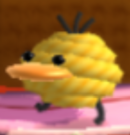Peeply: Difference between revisions
From the Super Mario Wiki, the Mario encyclopedia
Jump to navigationJump to search
m (Reverted edits by 39.88.50.74 (talk) to last revision by Somethingone) Tag: Rollback |
No edit summary Tag: Reverted |
||
| Line 7: | Line 7: | ||
}} | }} | ||
'''Peeplys''' are small chick enemies that appear in ''[[Yoshi's Woolly World]]'' and ''[[Poochy & Yoshi's Woolly World]]''. They only hurt [[Yoshi]] by walking into him and can be defeated with any attack, but they are usually found in groups. Peeplys use [[Miss Cluck]] as a disguise to hide from Yoshi. [[Miss Cluck the Insincere]], the boss of [[World 3 (Yoshi's Woolly World)|World 3]], is a Peeply that [[Kamek]] enlarged. | '''Peeplys''' are small chick enemies that appear in ''[[Yoshi's Woolly World]]'' and ''[[Poochy & Yoshi's Woolly World]]''. They only hurt [[Yoshi]] by walking into him and can be defeated with any attack, but they are usually found in groups. If a Peeply is eaten, it'll turn into a yellow yarn ball. Peeplys use [[Miss Cluck]] as a disguise to hide from Yoshi. [[Miss Cluck the Insincere]], the boss of [[World 3 (Yoshi's Woolly World)|World 3]], is a Peeply that [[Kamek]] enlarged. | ||
==Names in other languages== | ==Names in other languages== | ||
Revision as of 20:58, December 15, 2023
| Peeply | |||
|---|---|---|---|

| |||
| First appearance | Yoshi's Woolly World (2015) | ||
| Latest appearance | Poochy & Yoshi's Woolly World (2017) | ||
| |||
Peeplys are small chick enemies that appear in Yoshi's Woolly World and Poochy & Yoshi's Woolly World. They only hurt Yoshi by walking into him and can be defeated with any attack, but they are usually found in groups. If a Peeply is eaten, it'll turn into a yellow yarn ball. Peeplys use Miss Cluck as a disguise to hide from Yoshi. Miss Cluck the Insincere, the boss of World 3, is a Peeply that Kamek enlarged.
Names in other languages
| Language | Name | Meaning | Notes |
|---|---|---|---|
| German | Pieplis[?] | ? | |
| Italian | Pyo Pyo[?] | From "pio pio" (onomatopoeia for chick's peeping) | |
| Spanish (NOA) | Piopolline[?] | ? | |
| Spanish (NOE) | Lanuelo[?] | Portmanteau of "lana" (wool) and "polluelo" (chick) |